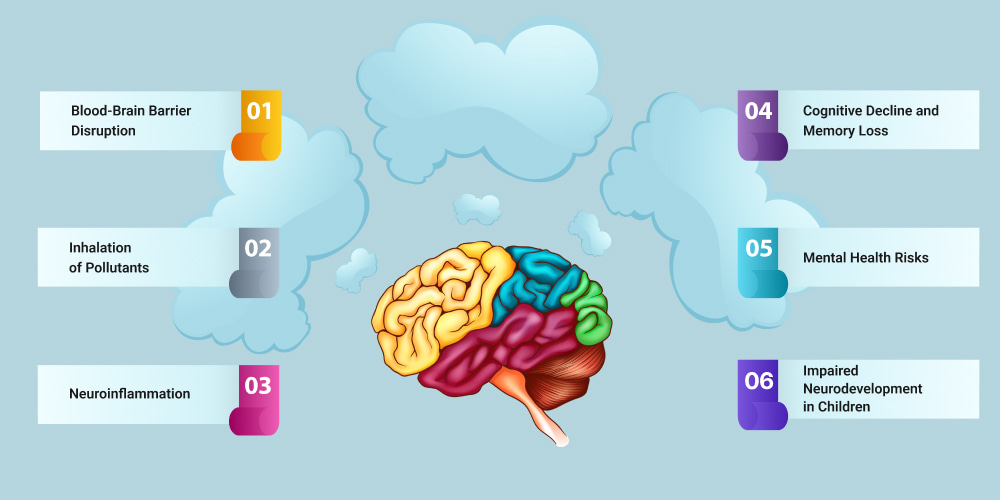Scientists conducted an interesting study. It was focused entirely on how air pollution affects mental health. The results showed that it leads to a high risk of developing anxiety. A high probability of depressive states was also recorded. Among the volunteers were people who lived in highly polluted areas. This indicates the harmful effect of air pollution on mental health. The harmful effects of air pollution are toxic. They are generally associated with increased expression of pathology markers of neurodegenerative diseases. These include alpha-synuclein or beta-amyloid. These substances contribute to the development of neurodegenerative diseases.
Among the various organic compounds, PAHs are of particular concern for brain health. Polycyclic aromatic hydrocarbons are no less harmful. They are neurotoxic to the developing brain. Such metals and metalloids are also found in the air. They include lead (Pb), manganese (Mn), methylmercury (MeHg) and arsenic (As). We must address air quality concerns to proactively protect brain health. Let’s discuss this topic in detail.
How Air Pollution Affects the Brain: Unseen Risks
The impact of air pollution on brain function is significant. It is increasingly recognized as a major public health concern. Studies reveal that airborne toxins silently damage the central nervous system. It leads to severe disorders. Here’s how air pollution affects the human brain:
- Blood-Brain Barrier Disruption: Pollutants can weaken this protective barrier. It allows toxins to infiltrate brain tissue. Disruption contributes to swelling and oxidative stress.
- Inhalation of Pollutants: Fine particulate matter (PM2.5), heavy metals, and toxic gases are harmful. They enter the lungs and bloodstream. These pollutants travel to the brain and trigger harmful effects.
- Neuroinflammation: Chronic exposure to air pollution increases inflammatory responses. It damages neurons. Air pollution accelerates Alzheimer’s and Parkinson’s diseases.
- Cognitive Decline and Memory Loss: Studies link high pollution levels to reduced cognitive function, memory impairment and increased risk of dementia.
- Mental Health Risks: Airborne toxins may contribute to anxiety, depression, and other disorders. It alters neurotransmitter balance.
- Impaired Neurodevelopment in Children: Exposure during early life can affect brain function. It leads to lower IQ, attention deficits, and behavioral disorders.
Understanding these mechanisms highlights the urgent need for pollution control measures. It helps to protect the brain and overall neurological health. Addressing environmental toxins is essential for reducing long-term cognitive risks.
Cognitive Decline: A Growing Concern
Research highlights the damaging effects of prolonged exposure to air pollution. Vulnerable populations, especially the elderly, face heightened risks. Environmental toxins accelerate brain aging and neurodegeneration. How does pollution contribute to cognitive decline? Let’s explore:
- Increased Risk of Dementia: Studies from Harvard and the University of Southern California have shown that long-term exposure to fine particulate matter (PM2.5) significantly raises the risk of dementia. It also causes Alzheimer’s disease.
- Brain Inflammation and Neuron Damage: Pollutants trigger chronic inflammation in the brain. It leads to oxidative stress and neuronal degeneration, key factors in cognitive decline.
- Impaired Blood Flow to the Brain: Pollutants can constrict blood vessels. They limit the oxygen supply to brain cells and accelerate neurodegeneration.
- Higher Susceptibility in the Elderly: Aging brains are more vulnerable to toxin-induced damage. It makes older adults especially prone to memory loss and reduced cognitive function.
- Reduced Brain Volume: MRI studies show that older adults are generally exposed to high air pollution. They exhibit reduced gray matter. It affects memory, reasoning, and decision-making.
Protecting health requires urgent action to reduce pollution exposure, especially for at-risk populations. Addressing environmental risks can help slow mental decline. It also improves long-term brain health.
Impact on Brain Function and Development
Exposure to environmental toxins from pollution significantly threatens the brain. This is especially true in children and young adults. Early-life exposure to pollutants can affect cognitive abilities, learning potential, and neurological development. How do toxins impact the developing brain? Let’s explore:
- Lower IQ and Learning Deficits: Prenatal and early childhood exposure to environmental toxins is associated with lower IQ scores, reduced attention spans, and difficulties in problem-solving.
- Disrupted Brain Development: Fine particulate matter (PM2.5), heavy metals, and toxic gases can interfere with brain growth, leading to structural abnormalities and impaired neural connections.
- Oxidative Stress: Early exposure to environmental toxins triggers chronic inflammation in the brain. It increases the risk of long-term neurodevelopmental issues.
- Increased Risk of Behavioral Disorders: Pollutants have been generally associated with conditions like attention deficit hyperactivity disorder (ADHD). Autism spectrum disorders and other cognitive impairments in children may also appear.
- Long-Term Cognitive Impairment: Children exposed to high pollution may experience memory problems. They slow cognitive processing into adulthood.
Reducing exposure to pollution is crucial for protecting brain function. It ensures healthy cognitive development in younger populations.
The Link Between Air Pollution and Neurological Disorders
Growing evidence suggests a strong connection between pollution and the development of severe neurological disorders. They include Alzheimer’s, Parkinson’s, and multiple sclerosis. Exposure to airborne toxins can damage brain cells. It accelerates neurodegeneration and even triggers disease onset. How does air pollution affect neurological health? Let’s explore:
- Increased Risk of Alzheimer’s Disease: Long-term exposure to fine particulate matter (PM2.5) is dangerous. This is typically linked to amyloid plaque buildup, which is a hallmark of Alzheimer’s. This accelerates cognitive decline and memory loss.
- Worsening of Parkinson’s Disease: Pollution contributes to dopamine neuron loss. It is a key factor in Parkinson’s progression. Heavy metals and ultrafine particles are especially harmful.
- Neuroinflammation and Brain Damage: Pollutants trigger chronic inflammation and oxidative stress. It leads to neuronal death and an increased risk of neurodegenerative disorders.
- Stroke and Vascular Brain Damage: Air pollution is typically linked to increased stroke risk. It contributes to blood vessel constriction, reduced oxygen supply, and elevated blood pressure.
- Higher Susceptibility to Multiple Sclerosis (MS): Exposure to pollutants may worsen symptoms. This can intensify immune system dysfunction and inflammation.
- Accelerated Brain Aging: Prolonged pollution exposure is generally associated with faster cognitive decline. It leads to reduced brain volume and impaired neural connectivity.
Addressing pollution is essential to protecting neurological health. It reduces the global burden of neurodegenerative diseases. Cleaner air policies and personal protective measures prevent long-term brain damage.
Combating the Effects of Air Pollution on Brain Health
Protecting the brain from the harmful effects requires a combination of individual actions. They also need community initiatives and medical interventions. Here are effective ways to reduce exposure and mitigate cognitive risks. Let’s begin with individual strategies:
- Use Air Purifiers Indoors: High-efficiency particulate air (HEPA) filters can reduce indoor pollutants. They improve air quality in homes and workplaces.
- Limit Outdoor Exposure on High-Pollution Days: Check air quality indexes (AQI). Avoid outdoor activities when pollution levels are high.
- Wear Protective Masks: N95 or higher-grade masks filter fine particulate matter (PM2.5) outdoors.
- Adopt a Brain-Healthy Diet: Antioxidant-rich foods combat oxidative stress caused by air pollution. They are leafy greens, nuts, and fish high in omega-3s.
- Stay Physically Active: Regular exercise improves blood circulation. It supports brain function. Physical activity counteracts some pollution-related effects.
There are community and environmental measures. Let’s check:
- Advocate for Cleaner Energy Sources: Support policies that promote renewable energy. It reduces air contaminants at a systemic level.
- Increase Green Spaces: Trees and urban greenery help absorb pollutants. They also improve overall air quality.
- Support Public Transportation and Carpooling: Reducing vehicle emissions lowers air pollution and benefits brain health.
Now, we will explore medical and technological interventions:
- Regular Health Check-Ups: Monitoring cognitive health helps detect early signs of pollution-related decline.
- Cognitive Training Programs: Engaging in brain-stimulating activities may help offset pollution-induced cognitive decline.
- Anti-Inflammatory Treatments: Medical interventions target neuroinflammation. They could reduce the effects of pollution on the brain.
Individuals and communities must implement these strategies. They can take proactive steps. They protect brain function and minimize the risks associated with pollution.
What Can Be Done to Improve Neurological Health in Polluted Environments?
Protecting health in high-pollution areas requires personal actions and broader policy measures. They help to reduce exposure to environmental toxins. How can individuals, communities, and governments help mitigate these risks? Let’s explore effective strategies:
- Improve Indoor Air Quality: Use HEPA air purifiers and close windows during high-pollution days. It helps to limit exposure to environmental toxins.
- Wear Protective Masks: N95 or higher-grade masks can filter fine particulate matter (PM2.5). They also filter out other pollutants when outdoors.
- Maintain a Healthy Diet: Antioxidants, omega-3 fatty acids, and vitamin-rich foods are crucial. They help protect the brain from oxidative stress caused by pollution.
- Limit Outdoor Activities During Peak Pollution: Monitor air quality indexes (AQI). Avoid outdoor exercise when pollution levels are high.
Here are community and policy measures:
- Awareness Campaigns and Research Funding: Educating communities about the impact of pollution on neurological health and supporting research on preventive measures can drive change.
- Stronger Pollution Regulations: Governments should enforce stricter emissions standards for industries. They must apply these standards to vehicles to reduce toxins in the air.
- Urban Greening Initiatives: Planting trees and expanding green spaces help absorb pollutants. It also improves overall air quality.
- Improved Public Transportation and Clean Energy: Investing in electric vehicles is valuable. Investing in bike-friendly infrastructure and renewable energy sources can also help. They can reduce environmental toxins exposure.
Polluted air is slowly but surely destroying our health. Want to get your physical health in order? Contact LoneStarNeurology.













Please, leave your review
Write a comment: